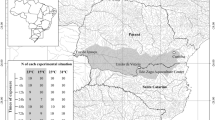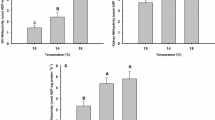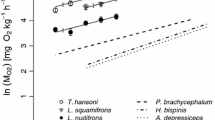Abstract
Juvenile axolotls were acclimated to 15○C or 25○C and either fed or fasted at both temperatures, to study the interaction of thermal acclimation and nutritional state on metabolism. Fasting but not thermal acclimation significantly increased oxygen consumption at 15○C. Fasting also increased the specific activities of two oxidative metabolic enzymes – citrate synthase and cytochrome oxidase – but not that of the glycolytic enzyme lactic dehydrogenase. The specific activity of cytochrome oxidase was further stimulated by cold acclimation. Triglycerides and fatty acids were severely depleted in fasted animals, but thermal acclimation had no significant effect on lipid stores. This study illustrates: (1) the differential nature of various metabolic responses to fasting; and (2) the confounding interaction of the nutritional state on thermal acclimation experiments in an ectotherm.
Similar content being viewed by others
Author information
Authors and Affiliations
Corresponding author
Rights and permissions
About this article
Cite this article
Irwin, L.N., Talentino, K.A. & Caruso, D.A. Effect of fasting and thermal acclimation on metabolism of juvenile axolotls (Ambystoma mexicanum). EBO 3, 1–11 (1998). https://doi.org/10.1007/s00898-998-0001-7
Received:
Accepted:
Issue Date:
DOI: https://doi.org/10.1007/s00898-998-0001-7




